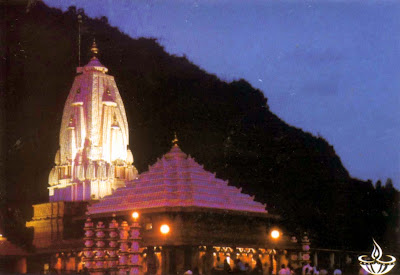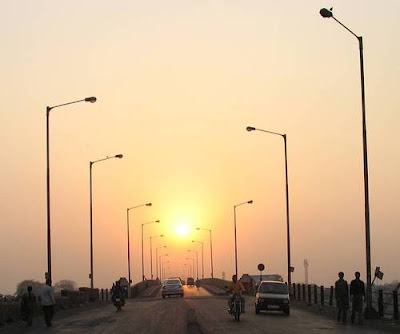Sparkling blue waters, endless stretches of golden or silver sand, sun beams dancing through the swaying palms, waves playing with the sand dunes, a cool breeze whispering sweet nothing in your ear. This is the land of Ganpatipule, one of Maharashtra's almost virgin beaches.
Nestled in the greenery is an almost 4000 year old land mark - the Swayambhu Ganapati temple (Swayambhu means 'self-made', this is a temple of the self-originated idol, Ganapati). It is flooded by thousands of devotees and tourists every year. Thus the village got its name Ganapatipule, Ganapati the lord of the "ganas" or army and "pule" which means sand dunes, Ganapatipule is one of the "Ashta Ganapatis" (eight Ganapatis) of India and is known as "Paschim Dwar Dewata" (the Western Sentinel God).
Ganapatipule is a small village, serene, sedate and unspoiled. The beach here is still as natural and pristine as ever. And traveling by roads is an experience by itself. The vast "Konkan" stretch abounds with scenic greenery. There are narrow mud-roads, the earth is red and the roofed houses with clean courtyards add a quaint touch to the panorama. The local vegetation includes fruit bearing trees like mango, betelnut, banana, jackfruit, coconut, etc. The entire western coast is covered with these trees. The locals are as warm and cheerful as their surroundings. Ever ready to chat with the visitors and make them feel at home.
These god-fearing local devotees take a "Pradakshina" around the hill where the temple is located, not just around the temple (Pradakshina is a form of showing obeisance wherein the devotee walks in a circle around the idol of the lord or around the temple, the house of the lord), As for the tourists, they can go walking simple to enjoy the beautiful surroundings.
Geographic Location: Ganapatipule lies along the Konkan coast, approximately 375 kms south of Mumbai.
Climate: The coastal climate is mostly hot and humid but it is healthy and devoid of pollution. The temperature is at its peak (around 38 Degree C) in the month of March. The monsoon falls between June and October. The rains are regular here. The climate is pleasant in winter and the temperature often falls at night.
Languages Spoken: Marathi is the common language here. People also know Hindi and English.
Local Festivals: All the festivals are celebrated with great enthusiasm and a spirit of togetherness. Gauri Ganapati and Magh Chaturthi are the most important events in the entire Konkan region. Holi, Gudi Padva and Diwali are well celebrated here, too.
What to wear: Loose cotton attire is suitable and comfortable. Although during winters, warm clothing is preferable. Swimming costumes are recommended for people indulging in water - sports.
What to eat: Since Ganapatipule is a pilgrimage destination, non - vegetarian food is a little rare. But on the outskirts of Ganapatipule fish curry, rice and kokam kadhi are available. Vegetable curries are also very tasty, prepared with a coconut base. "Modak" the favorite sweet meat of Lord Ganesh is also available.
What to Buy: The Konkan coast is rich in horticulture and the place is filled with delicious exotic fruits. These are also turned into sweet preparations like Ambapoli and Phanaspoli (pancakes of dried mango and jackfruit respectively). If you visit during the mangi season, don't forget to buy the world famous Devgad "Hampus" mangoes.
Where to Stay: The MTDC resort lies on the slope of a green hillock, facing the sea. Alphonso mango trees and coconut palms dot the 45 acre grounds. Sea view cottages. tents and Konkani houses are also available (The latter two are not rented out during the monsoons). By Air: Nearest airport is Belgaum, 299 Kms.
By Rail: On Konkan Railway Bhoke is 35 Kms. However the convenient railhead Ratnagiri is 45 Kms.
By Road:
Pune - Ganapatipule is 331 Kms.
Belgaum - Ganapatipule is 299 Kms.
S. T. Buses ply from Mumbai and Ratnagiri to Ganapatipule.
Book Your Trip Instantly: Travelmasti.com
Call : 011-47666799




























